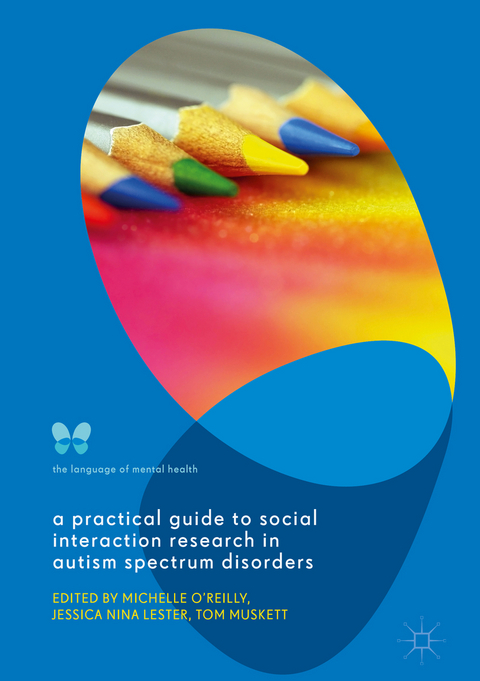
A Practical Guide to Social Interaction Research in Autism Spectrum Disorders
Palgrave Macmillan (Verlag)
978-1-137-59235-4 (ISBN)
Presented in two parts, this innovative volume first provides a set of pedagogical chapters to develop the reader's knowledge and skills in using these approaches, before moving to showcase the use of discursive methods through a range of original contributions from world-leading scholars, drawn from a range of disciplines including sociology, academic and clinical psychology, speech and language therapy, critical disability studies and social theory, and medicine and psychiatry.
Michelle O’Reilly is a Senior Lecturer for the Greenwood Institute of Child Health at the University of Leicester, and Research Consultant for Leicestershire Partnership NHS Trust. Michelle’s research interests are broadly in child mental health, family therapy, and the sociology of health and illness. Jessica Nina Lester is an Assistant Professor of Inquiry Methodology in the School of Education at Indiana University, USA. She teaches research methods courses, including discourse analysis, with much research focused on the study and development of qualitative methodologies and methods. Tom Muskett is a Senior Lecturer in Psychology at Leeds Beckett University, UK. He has worked in clinical and educational roles with children with diagnoses of autism and their families, and previously led a clinical training programme at the University of Sheffield, UK.
Chapter 1. Autism Spectrum Disorder: An introduction; Karim.- Chapter 2. Social constructionism, Autism Spectrum Disorder and the discursive approaches; O’Reilly and Lester.- Chapter 3. Naturally occurring data versus researcher generated data; Lester, Muskett, & O’Reilly.- Chapter 4. Using conversation analysis to assess the language and communication of people on the autism spectrum: A case-based tutorial; Muskett.- Chapter 5. Understanding the autistic individual: A practical guide to discourse analysis; Charlotte Brownlow, Lindsay O’Dell & Tanya Machin.- Chapter 7. How to use research supervision in the development of a discursive psychology or conversation analysis project to study Autism; Smart and Denman.- PART II.- Chapter 8. The interaction is the work: rehabilitating risk in a forensic patient with Autism Spectrum Disorder and Learning Disability; Dobbinson.- Chapter 9. Children’s use of I don’t know during clinical evaluations for autism spectrum disorder: responses to emotion questions; Stickle, Duck, and Maynard.- Chapter 10. Discursive methods and the cross-linguistic study of ASD: A conversation analysis case study of repetitive language in a Malay-speaking child; Mohamed Zain, Muskett and Gardner.- Chapter 11. Conversation Analysis: A tool for analysing interactional difficulties faced by children with Asperger’s syndrome; Rendle-Short.- Chapter 12. Animating characters and experiencing selves: a look at adolescents with autism spectrum disorder constructing fictional storyboards with typically developing peers; Bottema-Beutel, Sterponi, & Louick.
| Erscheinungsdatum | 07.12.2017 |
|---|---|
| Reihe/Serie | The Language of Mental Health |
| Zusatzinfo | 6 Illustrations, color; 2 Illustrations, black and white; XXI, 362 p. 8 illus., 6 illus. in color. |
| Verlagsort | Basingstoke |
| Sprache | englisch |
| Maße | 148 x 210 mm |
| Themenwelt | Geisteswissenschaften ► Psychologie ► Klinische Psychologie |
| Geisteswissenschaften ► Psychologie ► Psychoanalyse / Tiefenpsychologie | |
| Geisteswissenschaften ► Sprach- / Literaturwissenschaft ► Sprachwissenschaft | |
| Medizin / Pharmazie ► Medizinische Fachgebiete ► Neurologie | |
| Medizin / Pharmazie ► Medizinische Fachgebiete ► Psychiatrie / Psychotherapie | |
| Sozialwissenschaften ► Soziologie | |
| Schlagworte | communication by people on the autism spectrum • Critical Discursive Psychology • cross-linguistic study of ASD • discourse and conversation analysis • how to talk to children with ASD • ‘I don’t know’ utterances in Autism • Naturally occurring data • Social constructionism • social interactions with ASD |
| ISBN-10 | 1-137-59235-4 / 1137592354 |
| ISBN-13 | 978-1-137-59235-4 / 9781137592354 |
| Zustand | Neuware |
| Haben Sie eine Frage zum Produkt? |
aus dem Bereich


